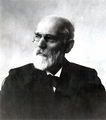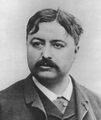Template:Selected anniversaries/November 23: Difference between revisions
No edit summary |
No edit summary |
||
| (One intermediate revision by the same user not shown) | |||
| Line 11: | Line 11: | ||
||1826: Johann Elert Bode dies ... astronomer known for his reformulation and popularization of the Titius–Bode law. Bode determined the orbit of Uranus and suggested the planet's name. Pic. | ||1826: Johann Elert Bode dies ... astronomer known for his reformulation and popularization of the Titius–Bode law. Bode determined the orbit of Uranus and suggested the planet's name. Pic. | ||
File:Johannes Diderik van der Waals.jpg|link=Johannes Diderik van der Waals (nonfiction)|1837: Theoretical physicist and academic [[Johannes Diderik van der Waals (nonfiction)|Johannes Diderik van der Waals]] born. He will win the 1910 Nobel Prize in physics for his work on the equation of state for gases and liquids. | File:Johannes Diderik van der Waals.jpg|link=Johannes Diderik van der Waals (nonfiction)|1837: Theoretical physicist and academic [[Johannes Diderik van der Waals (nonfiction)|Johannes Diderik van der Waals]] born. He will win the 1910 Nobel Prize in physics for his work on the equation of state for gases and liquids. | ||
| Line 82: | Line 80: | ||
||2015: Blue Origin's New Shepard space vehicle became the first rocket to successfully fly to space and then return to Earth for a controlled, vertical landing. | ||2015: Blue Origin's New Shepard space vehicle became the first rocket to successfully fly to space and then return to Earth for a controlled, vertical landing. | ||
||2016: Michel Marie Deza dies ... mathematician, specializing in combinatorics, discrete geometry and graph theory. Pic. | |||
|| | ||2020: Chang'e 5 launch: (Chinese: 嫦娥五号; pinyin: Cháng'é wǔhào[note 1]) is a robotic mission of the Chinese Lunar Exploration Program. Like its predecessors, the spacecraft was named after the Chinese moon goddess, Chang'e. It was launched on 23 November 2020 at 20:30 UTC from Wenchang Spacecraft Launch Site on Hainan Island and landed on the Moon on 1 December 2020, followed by returning to Earth with lunar samples on 16 December 2020, at 17:59 UTC. | ||
</gallery> | </gallery> | ||
Latest revision as of 16:23, 7 February 2022
1553: Physician and botanist Prospero Alpini born. He will travel around Egypt, serve as the fourth prefect in charge of the botanical garden of Padua, and write several botanical treatises covering exotic plants of economic and medicinal value.
1720: Clockmaker Jean-André Lepaute born. He will be an innovator, making numerous improvements to clockmaking, especially his pin-wheel escapement, and his clockworks in which the gears are all in the horizontal plane.
1837: Theoretical physicist and academic Johannes Diderik van der Waals born. He will win the 1910 Nobel Prize in physics for his work on the equation of state for gases and liquids.
1847: Engineer Charles Renard born. Renard will pioneer the design and construction of airships. He will also propose a set of preferred numbers now known as the Renard series.
1924: Edwin Hubble's discovery, that the Andromeda "nebula" is actually another island galaxy far outside of our own Milky Way, is first published in The New York Times.




